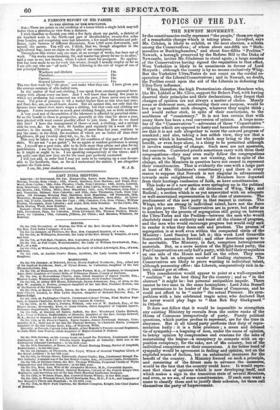TOPICS OF THE DAY.
THE NEWEST MOVEMENT.
IF the constituencies really represent " the people," there are signs of a remarkable change which is taking place. Liverpool, says Mr. Cobden, is likely to exhibit, at the next election, a schism among the Conservatives ; of whom about one-fifth are " Rich- mondltes or Buckinghamites," and about four-fifths " Peelites." Newark, a borough preserved by the Reform Bill to the Duke of Newcastle, invites Mr. Gladstone to stand again ; a large number of the Conservatives having signed the requisition to that effect. West Yorkshire is likely to be unanimous in favour of Lord Morpeth ; although the county is by no means exclusively Whig. But the Yorkshire Ultra•Tories do not count on the cordial co- operation of the Liberal Conservatives ; and in Newark, no doubt, the Peelites count upon the aid of the Liberals in defeating the Ultra-Tory influence. When, therefore, the high Protectionists charge Members who, like Mr. Liddell or Mr. Clive, support Sir Robert Peel, with having deserted their principles and their declarations, they forget that changes of opinion are not always a matter of choice. Merely mean or dishonest men, mistrusting their own purpose, would be less apt to manifest such changes, whatever they might think ; and would rather stick, in spite of their convictions, to the semblance of "consistency." It is not less certain that with many there has been a real conversion of opinion. A large num- ber of the " Conservatives"-advocates of those " Conservative " principles which are opposed to hasty and hazardous alterations- see that it is not safe altogether to resist the onward progress of mankind ; and also, taking a less selfish view, they see that a progress which is harmless, but which may bring to the people benefit, or even hope alone, is a thing to be permitted although it involve something of change. Such men are not apostates, but converts. Converted priests sometimes carry with them their congregations-they may even really follow the congregations they seem to lead. Signs are not wanting, that in spitepof the change, all the Members in question have not ceased to represent their constituencies. That is evidently the case with a large part at least of Mr. Gladstone's constituency ; and there is every reason to suppose that Newark is not singular in advancement towards more enlightened ideas. If Members have departed from their hustings confession of faith, so have constituencies.
This looks as if a new section were springing up in the political world, independently of the old divisions of Whig, Tilly, and Radical ; a section which is as yet unprovided with an adequate or well-ascertained representation in the class of statesmen. The predicament of this new party in that respect is curious. The Whigs, who are strong in individual talent, have not the force to get into power. The Conservatives are in power, but suffer as to numbers by the process of segregation still going on between the Ultra-Tones and the Peelites-between the men who would absolutely stand on authority and resist all the claims of proms.% and the men who would encourage progress but would only seek to render it what they deem safe and prudent. The process of segregation is at work even within the compacted circle of the Ministry : Lord Stanley has left it ; this week Lord Granville Somerset's secession is foretold ; and other desertions appear to be inevitable. The Ministry, in fact, comprises heterogeneous materials. But, as a mere section of the Right-hand party, the Peel Conservatives are only half a party, with half their sympathies on one side of the House and half on the other. They seem liable to lack an adequate number of leading statesmen. The Conservatives are likely to prove wanting in individual talent, although possessing office : the Liberals, comparatively rich in ta- lent, cannot get at office. This consideration would appear to point at a well-organized " coalition " as the best thing for the country ; and so in the abstract" it might be : but personal antipathies impede. There cannot be two suns in the same hemisphere : Lord John Russell has pretensions to be leader of the House of Commons, and he could not afford to be f°under " the actual Premier. he sym- pathizes with a late celebrated tragic actor, who declared that he never would play Iago to " that Rob Roy blackguard " in Othello.
It does not follow that it would be impossible to strengthen any existing Ministry by recruits from the entire ranks of the House of Commons irrespectively of party. Purely political questions, which parties profess to represent, are for the time in abeyance. But at all times! party performs that duty of repre- sentation badly : it is a false pretence ; a mean and debased tie of sympathy-a leaguing of men, under the name of opinion, to betray opinion by compromises and evasions for the sake of maintaining the league-a conspiracy to compete with an op- position conspiracy, for the sake, not of the country, but of the individual conspirators or their connexions. A far better bond of sympathy would be agreement in feeling and opinion, not on the exploded tenets of faction, but on substantial measures for the benefit of the country. A Ministry formed on such a principle, and consisting of the fittest men to advance the measures, would be the best that the country could have. It would repre- sent that class of opinions which is now developing itself, and which makes a sign in the transition state of several Members, and even, as we see, of some constituencies. If such men want a name to classify them and to justify their cohesion, let them call themselves the party of Improvement.


























 Previous page
Previous page